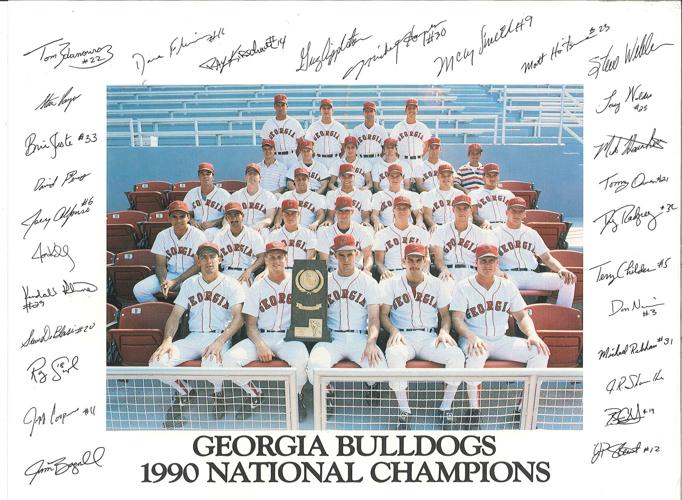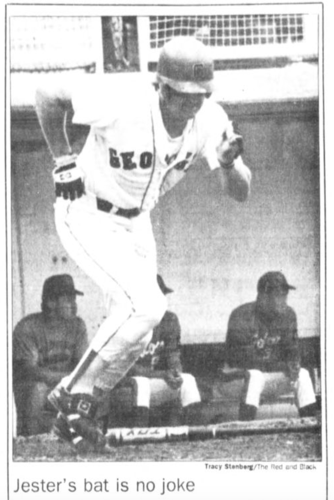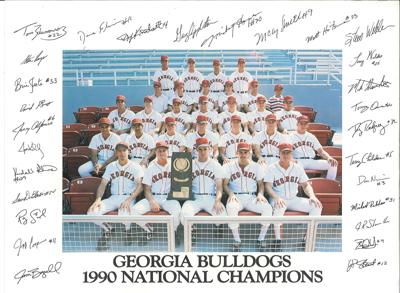On June 4, 1990, the Georgia baseball team had an off-day in Omaha, Nebraska, after demolishing a well-respected Stanford team 16-2 the night before in the second round of the College World Series. The Bulldogs were two wins away from playing in the CWS championship game. In part two of The Red & Black’s three-part series on Georgia baseball's only national championship run, we explore the season that led up to the 1990 team’s postseason shocker
In 1990, 24-year-old Foley Field looked more sandlot than Sanford. With wooden bleachers extending down the first baseline, a press box-concession stand combo taking up space behind the chain link backstop and a hill beyond third base serving as a student section, the Diamond Dogs’ home digs didn’t live up to their championship-contending stature. And Vince Dooley knew it.
“Some of [the fans] got splinters in their tails,” the former athletic director recalled. “One of the goals was to have a baseball stadium we could be proud of, and so we were pleased we were able to do that.”
The Georgia Athletic Board approved a $3.5 million renovation of Foley Field in the spring of 1989. Construction continued over the following year, and the 1990 champions took their team photo in the red fold-down chairs which had been installed behind home plate. They couldn’t pose like their predecessors in the outfield grass because tractors were still tearing it up.

A tractor rolls through the Foley Field outfield on May 30, 1990, two days before the team would secure the program's first CWS win in Omaha, Nebraska. The field's newly-constructed stands and press box sit in the background.
Yet before junior shortstop J.R. Showalter and All-American pitcher Dave Fleming could squint into the camera — the sun was in their eyes due to the altered photo location — with a College World Series trophy propped up between them, they first had to make history.
The peak
For one of the 23 athletes, seated and grimacing in their fresh-pressed dress whites, the road to Omaha started with a bang.
“The first pitch I saw that season, I hit a home run,” then-sophomore catcher Terry Childers said. “It was kind of a good omen.”
Partly because he wasn’t known as the best Bulldog bat, and partly because he’d had surgery on his right index finger a few months before, Childers had surprised himself with the dinger.
Despite a hot start in the season opener with a 10-2 smashing of the Jacksonville Dolphins, Georgia would drop three of their next four contests.
“We were always a notoriously slow starting team for whatever reason,” assistant coach Greg Appleton said. “The first series of the year is never really a good indicator of what you are and what you’re going to be.”
What they were was a group of guys that decided early on not to force success. It wasn’t up to senior leadoff man McKay Smith or senior third baseman Jeff Cooper or freshman designated hitter Tracy Wildes to carry the team. It was about settling into their roles and pushing forward as a unit.
What they were going to be, however, would soon become clear.

Georgia head coach Steve Webber from a Red & Black paper published on September 19, 1989.
After a 6-4 start that then-freshman left fielder Ray Suplee said knocked away their “world-beater” mentality and forced them back to basics, the Bulldogs won 31 of their next 35 games. They went on a 14-game and then a 12-game win streak with a handful of losses pockmarking their seemingly cruise-controlled summit to No. 5 in the country by April 26.
Suplee said head coach Steve Webber’s even-keeled demeanor, whether after their sweep of Auburn with a 32-12 run differential or after losing two of three to Vanderbilt, kept them focused on putting in the work and pursuing their postseason goals.
But the team's high-flying spring didn’t last as the days grew longer.
The valley
Despite scoring more than 10 runs in 16 outings during their midseason barrage, the Diamond Dogs hit double digits three times in their final 15.
At 43-12 — 18-6 in the SEC — No. 6 Georgia still led the conference heading into its final series of the regular season. But they weren’t quite themselves when they rolled into perhaps the most hostile baseball territory in the deep south: Baton Rouge, Louisiana.
“A Friday night in Baton Rouge?,” then-senior Brian Jester said, “You know, no, you’re probably not going to win that. Saturday? Yeah, you’d better hope they stayed out all late partying. They were really good.”

Senior first baseman Brian Jester books it out of the batter's box after knocking a home run early in the 1990 season.
In sweltering May heat and bayou humidity, which reached around 600 degrees by Appleton’s estimation, Georgia emerged from a 12-hour bus ride needing one game against the Tigers to take the No. 1 seed heading into the SEC tournament.
They were swept.
Even at batting practice the LSU faithful were ready and waiting to soften Georgia up for LSU’s final knockout blow. Suplee said they threw dog biscuits at the Georgia players as they walked into the stadium. A jazz band standing on one of the dugouts played a presumptive requiem for the procession of sweaty, slumping Bulldogs.
“I remember that sight,” Cooper said. “An old man in the stands in his white overalls [chanting] ‘Tiger bait! Tiger bait!' I remember that. And I know we left there without winning a game.”
LSU supplanted the Bulldogs as the SEC’s best heading into the conference tournament. Disjointed and unnerved by their first dropped series since March, Georgia went into Hoover, Alabama, licking their wounds.
They lost two more. Vanderbilt and Florida, which were both under .500 on the year, extended Georgia’s losing streak to five and left the team at its darkest since the season began.
But there was a glimmer on the horizon.
“We’re sitting there going ‘What the heck is going on?'” Appleton said. “‘Good God, we’ve had this great year, and now we’ve forgotten how to play.’ And lo and behold, we get put in a [CWS] regional.”






